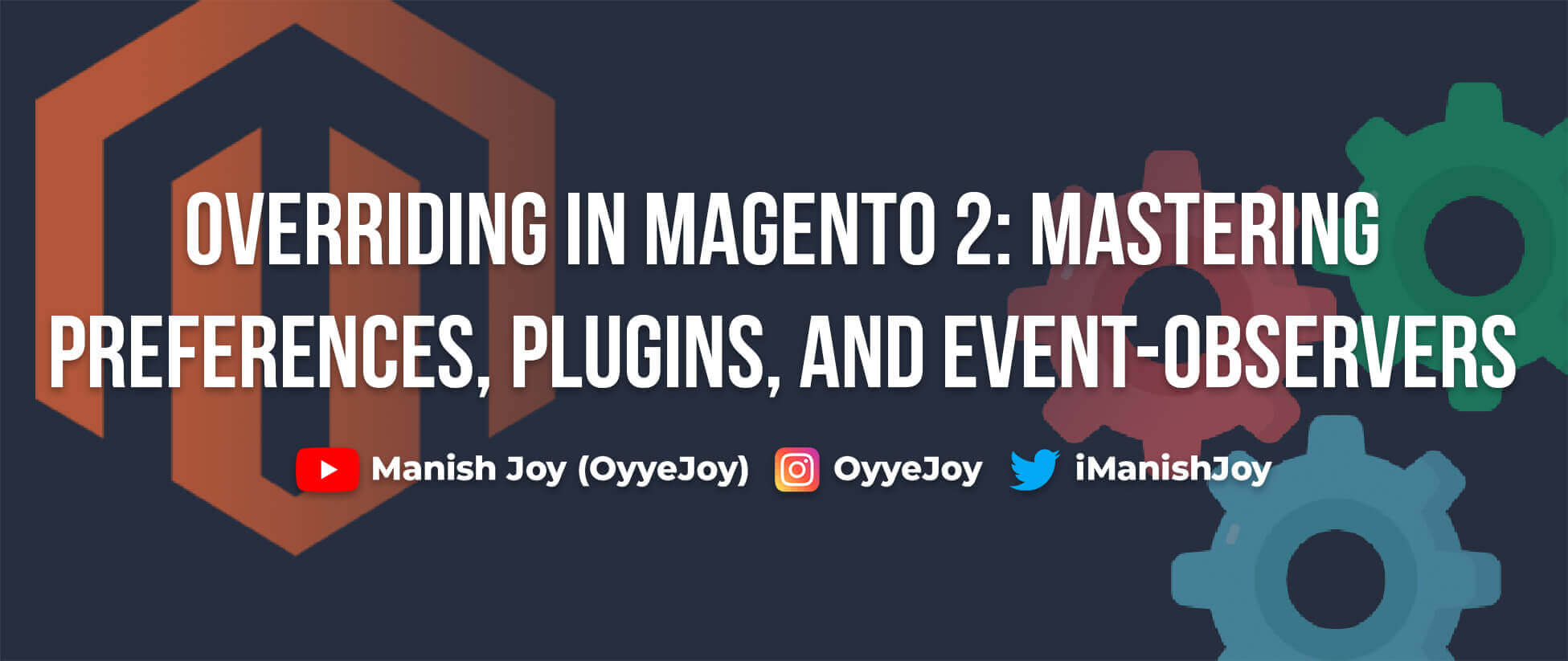Overriding in Magento 2: Mastering Preferences, Plugins, and Event-Observers
Magento 2 offers multiple ways to override and customize its core functionality, including preferences, plugins, and event-observers. Each method has its use cases, advantages, and best practices. This guide will explore these techniques in detail, helping you choose the best approach for your customization needs.
Overriding with Preferences
Preferences allow you to specify which class should be used whenever a particular class or interface is requested.
How to Use Preferences
Define a preference in your module’s di.xml file:
<?xml version="1.0"?>
<config xmlns:xsi="http://www.w3.org/2001/XMLSchema-instance" xsi:noNamespaceSchemaLocation="urn:magento:framework:ObjectManager/etc/config.xsd">
<preference for="Magento\Catalog\Model\Product" type="Vendor\Module\Model\CustomProduct"/>
</config>
Example: Custom Product Class
<?php
namespace Vendor\Module\Model;
class CustomProduct extends \Magento\Catalog\Model\Product
{
public function getName()
{
return 'Custom ' . parent::getName();
}
}
Advantages of Preferences:
- Direct Replacement: Easy to replace core classes with custom ones.
- Simplicity: Straightforward and easy to implement.
Disadvantages of Preferences:
- Global Impact: Replaces the class globally, affecting all instances.
- Maintenance: Can be difficult to manage in large projects with many preferences.
Overriding with Plugins
Plugins (also known as interceptors) allow you to modify the behavior of public methods without directly changing the core code.
Types of Plugins
- Before Plugins: Execute code before a method.
- After Plugins: Execute code after a method.
- Around Plugins: Wrap the method call with custom logic.
How to Use Plugins
Define a plugin in your module’s di.xml file:
<?xml version="1.0"?>
<config xmlns:xsi="http://www.w3.org/2001/XMLSchema-instance" xsi:noNamespaceSchemaLocation="urn:magento:framework:ObjectManager/etc/config.xsd">
<type name="Magento\Catalog\Api\ProductRepositoryInterface">
<plugin name="custom_product_plugin" type="Vendor\Module\Plugin\ProductPlugin"/>
</type>
</config>
Example: Product Plugin Class
<?php
namespace Vendor\Module\Plugin;
class ProductPlugin
{
public function beforeGetById(\Magento\Catalog\Api\ProductRepositoryInterface $subject, $productId)
{
// Code to execute before getById method
}
public function afterGetById(\Magento\Catalog\Api\ProductRepositoryInterface $subject, $result)
{
// Code to execute after getById method
return $result;
}
public function aroundGetById(\Magento\Catalog\Api\ProductRepositoryInterface $subject, callable $proceed, $productId)
{
// Code to execute around getById method
$result = $proceed($productId);
return $result;
}
}
Advantages of Plugins:
- Granular Control: Modify specific methods without affecting the entire class.
- Flexible: Combine multiple plugins on the same method.
Disadvantages of Plugins:
- Complexity: Can become complex with many plugins on the same method.
- Performance: Overuse can impact performance due to additional method calls.
Overriding with Event-Observers
Event-Observers allow you to respond to specific events triggered throughout the Magento application.
How to Use Event-Observers
Define an event observer in your module’s events.xml file:
<?xml version="1.0"?>
<config xmlns:xsi="http://www.w3.org/2001/XMLSchema-instance" xsi:noNamespaceSchemaLocation="urn:magento:framework:Event/etc/events.xsd">
<event name="catalog_product_save_after">
<observer name="custom_product_save_observer" instance="Vendor\Module\Observer\ProductSaveAfter"/>
</event>
</config>
Example: Product Save Observer Class
<?php
namespace Vendor\Module\Observer;
use Magento\Framework\Event\Observer;
use Magento\Framework\Event\ObserverInterface;
class ProductSaveAfter implements ObserverInterface
{
public function execute(Observer $observer)
{
$product = $observer->getEvent()->getProduct();
// Custom logic for product save
}
}
Advantages of Event-Observers:
- Event-Driven: Respond to specific events without altering the core code.
- Modularity: Decoupled logic from core functionality.
Disadvantages of Event-Observers:
- Visibility: Less visible than direct method overrides.
- Debugging: Can be harder to debug due to event-driven nature.
Read More Details Here: Event and Observer in Magento 2: A Comprehensive Guide
Best Practices
- Use Dependency Injection: Prefer dependency injection over direct ObjectManager usage.
- Limit Preferences: Use preferences sparingly to avoid global replacements.
- Combine Plugins: Use a combination of plugins and event-observers for granular control.
- Test Extensively: Ensure thorough testing to avoid conflicts and performance issues.
Conclusion
Magento 2 provides multiple methods for overriding core functionality, each with its own strengths and use cases. By understanding and leveraging preferences, plugins, and event-observers, you can create powerful and maintainable customizations for your Magento 2 store.
Liked the post, share with others:




